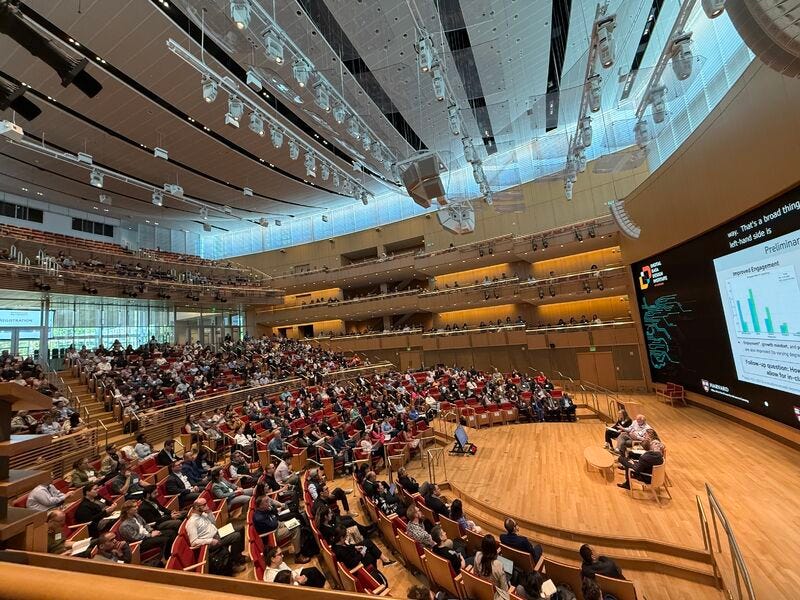Generative AI and the Future of Learning
Reflections from the Harvard Symposium | May 13, 2025
Yesterday, Harvard hosted its first university-wide Generative AI Symposium—a milestone moment for the institution's evolution as an “AI University.”
Organized by the Digital Data Design Institute (D^3) in partnership with the Office of the Vice Provost for Research, Advances in Learning, Faculty of Arts and Sciences, Harvard John A. Paulson School of Engineering and Applied Sciences (SEAS), Harvard IT, and the Harvard Library, the event convened researchers, educators, and technologists to explore how generative AI is reshaping higher education. Despite finals taking place at the same time, 100 students still attended.
Not Just a Technology Story—An Institutional Shift
This is more than a tech story. Harvard is treating generative AI as an institutional opportunity to:
Advance research and scholarship
Reshape teaching and learning
Stay grounded in its educational mission
A striking data point shared during the event: Harvard now operates 1,500 CPUs and 350 GPUs for AI, making it the third largest AI infrastructure among global universities.
A Culture Shift: From Caution to Imagination
Harvard is not known for moving quickly—but that’s starting to change.
As Karim Lakhani observed in his opening comments, “this is the first time the university has come together as a single AI institution”.
In one example of agility, Harvard adapted the Milton Fund overnight to issue seed grants for AI research. One outcome: a new program offering 51 summer scholarships for students to explore generative AI.
A panel of scholars made it clear that the goal isn’t to replace expertise—it’s to automate the mundane, freeing students, faculty, and staff to spend more time on meaningful, high-value work.
One interesting data point: An instructor from Harvard’s Faculty of Arts and Sciences reported increased student engagement and deeper conceptual understanding, based on findings from a recent study.
Ironically, one speaker observed that as we rely more on AI to automate work, the demand for human insight and critical thinking only grows.
Challenges at the Intersection of AI and Education
The symposium didn’t shy away from complexity. Key challenges include:
The adverse effects of AI on academic integrity and admissions
Ethical and regulatory frameworks still in flux
Uneven adoption across schools—HBS is moving with structured intent, while Harvard College remains more fragmented
One of the biggest hurdles? “The pace of AI innovation is fundamentally incompatible with the traditional pace of change in education.”
Still, early results show promise:
Improved engagement
Improved learning outcomes
The fusion of expertise and technology
The Road Ahead: What Can—and Can’t—Be Outsourced?
A major theme: understanding what can be offloaded to AI, and what must remain human.
Harvard is beginning to explore iterative assessment models—rethinking learning as a collaborative process where students and AI work together to tackle complex, open-ended questions that even machines can't answer (yet).
And for those with deep domain expertise? Generative AI is becoming a superpower—unlocking new forms of productivity, creativity, and insight.
Conclusion
The Harvard Generative AI Symposium was deeply inspiring. It underscored a major turning point in the university’s journey to becoming a frontrunner in the age of AI. I admire the university’s commitment to advancing research and reimagining pedagogy, even amid growing political pressures, economic and societal instability.
What emerged was a clear sense that generative AI is not simply a new tool—it is a catalyst for reimagining how we teach, learn, and discover. As Harvard navigates the balance between technological acceleration and academic tradition, one thing is certain: the institutions that lean into thoughtful experimentation today will shape the future of education tomorrow.



Doug, great summary. This is an impressive set of coordination among all these Harvard schools.